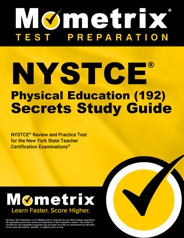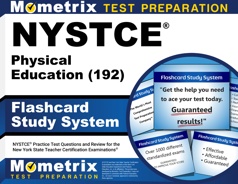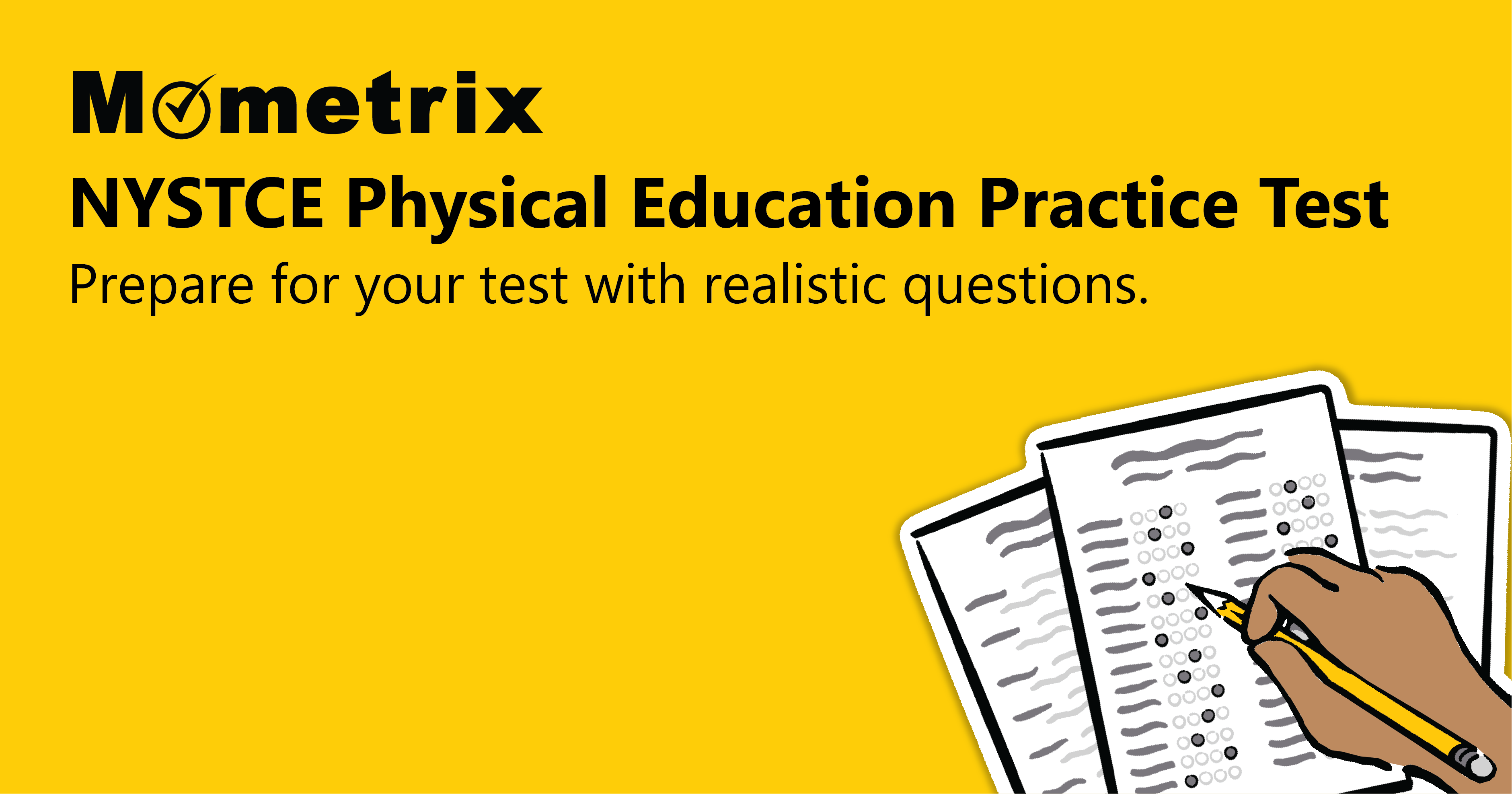The New York State Teacher Certification Exams program (NYSTCE) was designed for teachers in New York State to ensure proficiency in specific educational areas. The NYSTCE Physical Education exam is designed for prospective physical education teachers in the state of New York.
Click “Start Test” above to take a free NYSTCE Physical Education practice test, and check out our premium-quality NYSTCE test prep resources by clicking the links below!
NYSTCE Physical Education Exam Outline
The NYSTCE Physical Education exam contains 90 selected-response questions and one constructed-response question, and you will be given a time limit of 3 hours and 15 minutes.
The exam is split into six competencies:
1. Motor Development and Physical Literacy (16%)
The questions in this competency are designed to assess your knowledge and skills pertaining to the following:
- Analyzing critical elements and sequencing of motor skills development
- Principles and components of perceptual-motor abilities
- Relationships between motor development and social, cognitive, emotional, and physical development
- Impact of environmental, cultural, health, familial, social, psychological, and economic factors of motor development and fitness
- Elements and characteristics of immature and mature motor patterns
- Detecting error in motor performance and providing positive correction
- Phases and characteristics of physical, cognitive, social, and emotional development through the lifespan
- Impact of peers and media on the development of attitudes, behaviors, and motivation related to physical activity
- The relationship between academic achievement and physical activity
- Community resources and consumer skills in relation to individual development and physical activity
2. Health-Related Fitness (16%)
The questions in this competency are designed to assess your knowledge and skills pertaining to the following:
- General functions and structure of the nervous, circulatory, skeletal, digestive, and muscular systems
- The role of body systems in producing movement
- The relationship between physical activity and the prevention of disease, illness, obesity, and premature death
- Sound nutritional principles and guidelines
- The relationship between nutrition and the functions of energy and body systems
- The dimensions of personal wellness
- Basic components of health-related physical fitness
- Principles of physical conditioning and training
- Appropriate activities to meet specific fitness goals
- Procedures and guidelines for safe and effective exercise and all levels of physical activity
- The relationship between physical activity and stress management
- Principles and activities for promoting health-related cardiorespiratory fitness, muscular strength and endurance, and flexibility
- Developing and maintaining body compositions that promote wellness
- Developing and implementing safe and effective individualized fitness and wellness plans
3. Movement Concepts, Skills, and Activities (16%)
The questions in this competency are designed to assess your knowledge and skills pertaining to the following:
- Key principles of anatomy, kinesiology, biomechanics, and physiology in relation to growth, movement, health, and physical performance
- Biomechanical and scientific principles
- Movement concepts related to relationships
- Spatial, temporal, and directional awareness
- Movement qualities and concepts
- Developing locomotor, non-locomotor, manipulative, and rhythmic skills in various movement sequences and patterns
- Techniques, motor patterns, and stages of development for fundamental motor skills
- Skills, skill progressions, rules, offensive and defensive strategies, techniques, safety practices, and types and uses of equipment for team passing, net/wall, target, and striking/fielding sports
- Principles, techniques, skills, safety practices, and rules for dance, aesthetic, personal performance, adventure, and outdoor activities
- Benefits of participating in physical activity
4. Mental, Social, and Emotional Health (16%)
The questions in this competency are designed to assess your knowledge and skills pertaining to the following:
- Stages and characteristics of cognitive, social, and emotional development and learning during childhood
- Development of the whole child
- The influence of various factors on physical, mental, social, and emotional health
- Connections between physical health, social and emotional health, and well-being
- The dimensions of wellness
- Positive physical activity behaviors
- Physical and psychological effects of stress
- Benefits of teamwork and participation in group physical activities
- Developing students’ self-awareness and management skills
- Factors that affect the development of students’ attitudes, behaviors, and motivation
5. Physical Education Instruction and Assessment (16%)
The questions in this competency are designed to assess your knowledge and skills pertaining to the following:
- The relationships and interactions among physical education, other subject areas, and the New York State P-12 Learning Standards
- Organization, challenges, purposes, and goals of physical education programs in schools
- Past and present philosophies, current trends and issues, historical and cultural developments, best practices, and model programs in physical education
- Psychological and sociological perspectives related to fitness, sports, and physical activity
- Communication techniques and collaborative strategies to establish partnerships
- Managing heterogeneous groups of children safely and equitably in physical activity settings
- Motor learning concepts as they relate to motor skill acquisition
- Physical education instructional approaches and methodologies for a variety of situations and developmental levels
- Utilization of technology and media for planning, implementing, and assessing student learning
- Adapting and modifying rules, equipment, activities, games, and instructional approaches to accommodate diverse learners
- Addressing diverse learning styles and fostering the engagement and inclusion of all students
- Physical education assessment methods, protocols, and tools for analyzing and evaluating student achievement
- Appropriate interpretations and communication of assessment results
- Legal and ethical standards and responsibilities associated with teaching physical education
- Federal and state laws and guidelines pertaining to physical education, privacy, gender equity, and special education
- Locating and evaluating commercial, media, and professional sources of information on physical activity, fitness and wellness, and physical education
6. Pedagogical Content Knowledge (20%)
The questions in this competency are designed to assess your knowledge and skills pertaining to the following:
- Developing learning objectives
- Explaining the alignment of learning objectives with the New York State Learning Standards
- Instructional activities that promote student achievement of learning objectives
- Assessing student readiness for successful participation in instructional activities
- Measuring and evaluating student performance and achievement
Check Out Mometrix's NYSTCE Study Guide
Get practice questions, video tutorials, and detailed study lessons
Get Your Study Guide
Exam Registration
To register for the NYSTCE Physical Education exam, you will need to create an NYSTCE account online and complete the registration process there. It is recommended that you complete the registration process at least 30 days before you take the exam.
During this process, you will be asked some questions about your educational history, as well as your current education level, first language, matriculation status, and the education code for the NYC Department of Education program type you are associated with.
The examination fee is $122.
Test Day
On the day of your test, you should arrive at the testing center about 30 minutes earlier than the scheduled exam time to allow time for the check-in process. Once you arrive, you will be asked to sign in and provide a valid form of government-issued photo ID.
Before the exam begins, you will be asked to place all personal items (cell phone, wallet, keys, etc.) in a locker outside the testing room, or you may be asked to leave them in your car.
Once the test begins, you will be allowed to take breaks. However, the timer will not be stopped during your break, so use your break time carefully.
How the Exam is Scored
Your total NYSTCE Physical Education score is based on the number of questions you answered correctly, which is then reported as a numerical figure in the range of 400-600. To pass the exam, you must achieve a scaled score of 520.
You should receive your test results roughly 2-4 weeks after taking the exam. When you receive your score report, you will see your total score, your pass/fail status, and your scores for each subarea of the test.
Check Out Mometrix's NYSTCE Flashcards
Get complex subjects broken down into easily understandable concepts
Get Your Flashcards
FAQs
Q
How many questions are on the NYSTCE Physical Education exam?
A
There are 91 questions on the exam.
Q
How long is the NYSTCE Physical Education exam?
A
The time limit for this exam is 3 hours and 15 minutes.
Q
What is the passing score for the NYSTCE Physical Education exam?
A
To pass the exam, you must achieve a scaled score of at least 520.
Q
How much does the NYSTCE Physical Education exam cost?
A
The examination fee is $122.
NYSTCE and New York State Teacher Certification Examinations are trademarks of the New York State Education Department and Pearson Education, Inc. or its affiliate(s). This page was developed by Mometrix Test Preparation. It was not developed in connection with Pearson Education, Inc., nor was it reviewed, approved or endorsed by these agencies.


